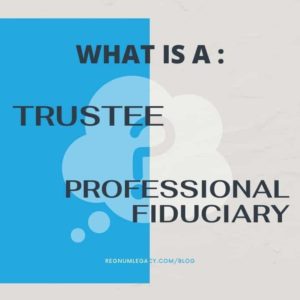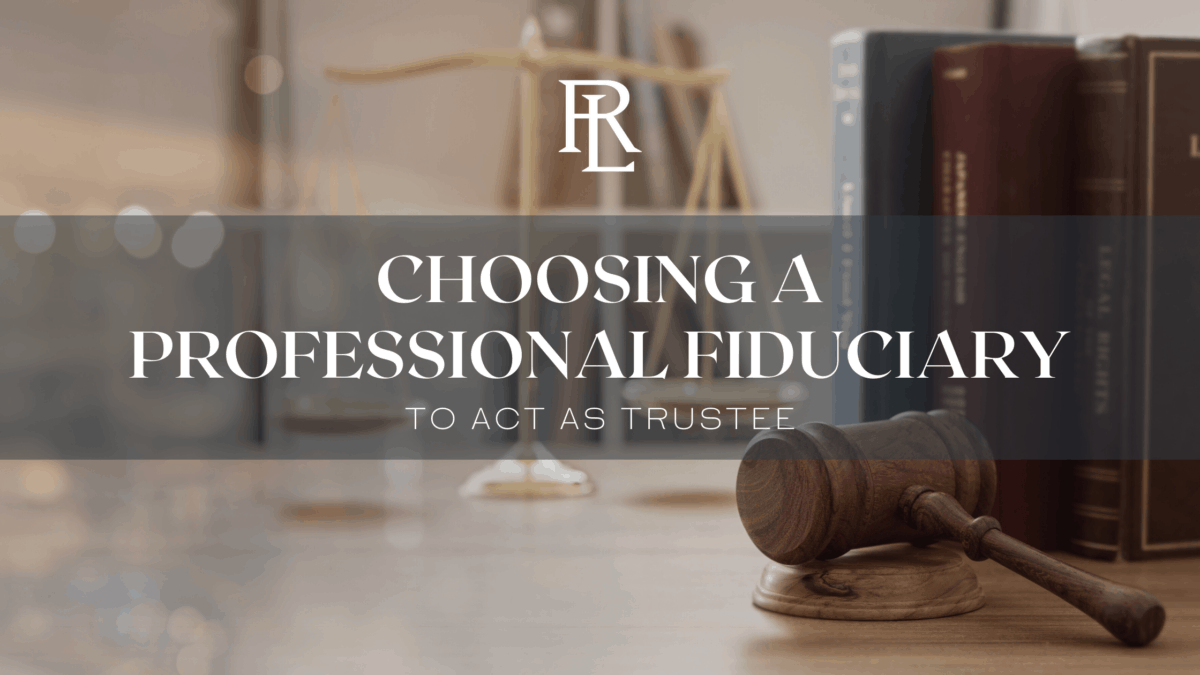Making plans for your money and property after you die is not the most exciting thing to do. It always involves thinking about circumstances that typically make you apprehensive, fearful, or uncertain. In fact, many people put-off estate planning because they do not want to deal with these difficult questions and emotions, which can have disastrous effects. Failing to plan for your estate because you are afraid of dealing with these difficult things all but guarantees that your loved ones will suffer after you are gone.
It is essential to face these challenges head-on. The estate planning process is all about helping you decide what people, things, and values matter most to you. One of the most important decisions you will make during the estate planning process is who to appoint as trustee. A trustee is the person or company you want managing, investing, and handing out the money and property owned by the trust.
In most of the estate plans I draft the client chooses a friend or family member for this important role. However, that is not always the best choice. In some cases, a professional fiduciary (or corporate trustee) may be better at managing your money and property when you die or if you become impaired and unable to manage your affairs.
What is a trustee?
A trustee is a fiduciary. That means a person who acts on behalf of, and for the exclusive benefit for, another person or entity. When you name someone as trustee that person is required to act on behalf of and for the benefit of, the trust.
I have outlined the essential duties of a trustee in a separate article. For now, all you need to understand is that the law requires that a trustee of a trust act in a fiduciary capacity. Meaning he/she/it cannot engage in self-dealing and must always conduct themselves for the benefit of the beneficiaries of the trust.
This is why picking a trustee is really important. It is also why picking a professional fiduciary may be the best choice (as we will discuss below).
What is a Professional Fiduciary?

A professional fiduciary is a person or company (called a corporate trustee) who is specially licensed to act in a fiduciary capacity. On behalf of a person or trust. A trustee is a fiduciary of the trust he/she/it is overseeing. The California Probate Code mandates that all professional fiduciaries who act as trustee hold a “valid, unexpired, unsuspended license as a professional fiduciary under [the Professional Fiduciaries Act].”1
The Professional Fiduciaries Act governs the qualifications of professional fiduciaries. In sum, in order to be a professional fiduciary a person must meet these qualifications:
- Be over 21 years of age.
- Has not engaged in criminal conduct.
- Pass a background check.
- Completed 30 hours of pre-license education, and 15 hours of continued post-license education each year.
- Passed the licensure examination.
- Have a B.A. Degree or an AA with education focusing on fiduciary responsibilities plus three years’ experience working as an agent under a power of attorney or trust.
- Agrees to adhere to the Professional Fiduciary Rules of Ethics.
- Pass a credit check.
Basically, a professional fiduciary is someone who has specialized education and experience, with no history of criminal behavior who understands how to manage trust assets, and how to perform in a fiduciary role.
Why Naming a Professional Fiduciary as Trustee May Be the Better Choice

Trustees of trusts need to perform a series of complex duties employing a wide variety of skills and mindsets. As we discussed above, a trustee must act in the best interests of the beneficiaries. Moreover, acting as a trustee comes with the risk of significant liability because the obligation to act in another’s best interest is imposed by law; the trustee must put the interests of that third party above the trustee’s own interests.
While this may seem unimportant and kind of intuitive, it is a complicated process that can get blurred when the trustee is BOTH the trustee and beneficiary.
The trustee’s job is time-consuming and often requires specialized skills and knowledge. For example, trustees must manage the trust’s accounts and property, must properly and effectively manage the investments of the trust, must be able to understand the terms of the trust and execute the instructions outlined in the trust. All of that while the trustee pays bills and keeps accurate and detailed records of every action taken.
Even for a professional these steps are time-consuming for even the most basic type of trust. Throw in a trust with some complicated assets and investments, and you add even more layers of complexity and time required of the trustee. For example, a trustee of a trust may be required to manage a business, monitoring property in multiple states, and providing oversight of unique accounts and property like stock portfolios and art collections.
Family members and friends simply may not have the requisite knowledge, time, and skill to take on such critical and elaborate tasks. Moreover, someone who is also a beneficiary may be tempted to act out of self-interest due to the intricate nature of relationships.
A friend or family member may have unconscious biases based on prior experiences that impact how they make decisions about the trust. Unconscious bias increases the complexities in blended families or families with pre-existing tensions. In these types of situations, naming a family member as trustee could be adding fuel to the fire.
Professional fiduciary trustees can better manage these different responsibilities and dynamics because they are (or can hire) skilled professionals in banks, firms, or trust companies. Further, a professional fiduciary (or corporate trustee) is a neutral third party. When disagreements arise between beneficiaries, a professional fiduciary’s job is to simply follow the instructions left in the trust agreement, and not get involved in the fighting.
How to Pick a Good Professional Fiduciary or Corporate Trustee

If you decide to name a professional trustee to act as the trustee of your trust, your next decision in the estate planning process must be to evaluate the various options for choosing a professional. The factors below are not all-inclusive. Instead, they are merely intended to be a good starting for your analysis.
- Minimum trust account requirements. Professional trustees have a wide range of minimum amounts for accounts, ranging from zero dollars to $1 million, depending on the individual or institution. There are also some instances where the minimum amount varies depending upon the size of the account or property. You must know the value of the trust’s accounts and property to properly evaluate each institution and see if your trust qualifies for that particular individual or corporate trustee.
- Cost of service charges. The charges associated with corporate trustee services are often based on a sliding scale determined by the account’s size. On average, you can expect to pay a professional fiduciary or corporate trustee 1 to 2.5 percent of the trust’s assets/value. There are some professionals or companies that have flat fee charges for lower value trusts. When deciding on a professional fiduciary consider the provisions of your trust and what the professional will be required to do. If the professional is going to be expected to manage a complex series of investments, then paying 2.5% of the trust value may be small potatoes compared to the rate of return received by the trust from the professional’s expertise. If you want to know a little more about trustee fees, check out the article I wrote called “Trustee Pay: How Much is Too Much?”
- When do you want the professional trustee to step into the role? Another important factor when selecting a professional fiduciary as trustee is understanding when they can step into the role. As you create your trust, one option available to you is appointing a professional trustee to serve as the co-trustee of your revocable trust or the primary trustee of your irrevocable trust. Allowing a professional or corporate trustee to begin managing your money and property while you are alive, can create an opportunity for the trustee to learn about your preferences and gain your valuable guidance. So when interviewing a professional fiduciary, be sure to discuss what the process looks like if they act as co-trustee with you while you are alive versus how it looks if they act only after you pass. Also be sure to ask if they have any additional requirements for either situation.
- Ease of use and communication between trustees and beneficiaries. It is critical to consider personality fit. That is, how well the trustee will work with and communicate with your beneficiaries. Sometimes a third-party professional trustee can take an approach that is more hands-off, resulting in a lack of genuine care. But this is not always the case. Professional trustees often prioritize consistent communication and are responsive to the needs of your beneficiaries. Because they are professionals, it is their job to manage your trust and keep your family informed.
- Experience managing money and property. The corporate trustee’s experience in handling trusts with accounts and property like yours is another qualification to consider. Some corporate trustees do not want to handle real estate. Firms that feel this way may either refuse to accept the appointment as trustee or may end up liquidating the real estate and managing the transaction’s profits. Pay careful attention to these details because they can impact what accounts or property your beneficiaries may ultimately have access to.
- Removing a corporate trustee. For the most part, the trust agreement is the primary tool for determining the steps to remove a corporate trustee. It is essential to include provisions in your trust for how a beneficiary can remove a professional trustee. For example, you can say that the trustee can only be removed by “unanimous vote” or by “majority vote.” Moreover, you can stipulate that a trustee can only be removed for “cause” (like fraud, mismanagement, excessive fees, etc.). Alternatively, you can stipulate that your beneficiaries can remove a trustee for “any cause” or “any reason.” Really, you need to decide how easy or hard you want to make it for a professional trustee to be removed, and then include specific language in your trust to accommodate your wishes.
- Additional provisions. Sometimes a professional trustee, especially if you are using a corporate trustee, will have their own specialized language they want in the trust. They may even give you suggested language to include in your trust or to sing, which may supersede your trust. If this happens you should have an experienced estate planning lawyer (like the lawyers at Atlantis Law) review these terms to be sure it does not interfere with your wishes.
We Can Help
Estate planning is a complicated but exceedingly gratifying process. But having the RIGHT plan in place is essential for the protection of your money, property, and legacy. Failing to plan adequately could leave your loved ones with a complicated and expensive mess on their hands. Choosing the right trustee is critical, it can seem overwhelming, even scary. Luckily, our experienced estate planning lawyers are here to help you. Call us today and refer to this article to receive $500 off your Family Legacy Meeting.




